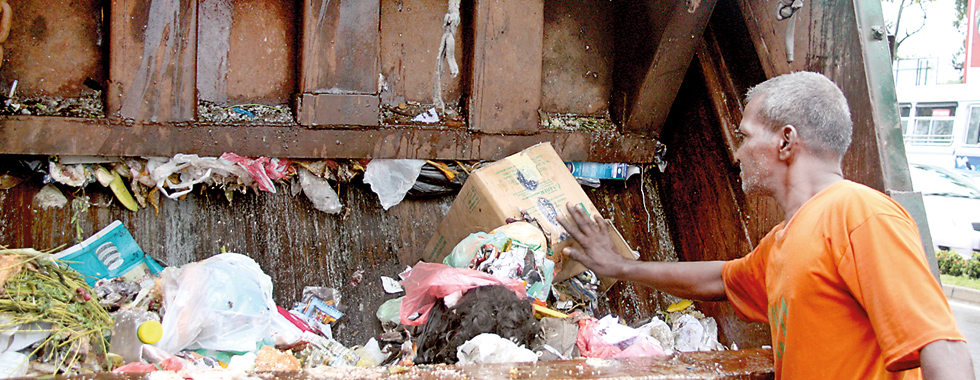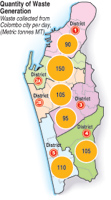News
Garbage collection waste deep in management and disposal
Garbage collection and disposal has become an essential service in the country, especially in the Western Province (WP), where much dedicated effort and resources are put in to ensure a smooth operation of the system. Although standards have improved by leaps and bounds in solid waste management in the country, in general, and the WP in particular, where over 700 tons of garbage are collected daily, the most crucial element in the garbage collection system – the garbage collectors – still work in deplorable conditions.

It’s a daily haul for Ratnam. Pic by Indika Handuwala
“Rain or shine, it doesn’t make much of a difference. We do our job,” says Raja Ratnam, a garbage collector attached to the Colombo Municipal Council (CMC) since 1984. Ratnam, like many of his other colleagues, wears no protective gear while working, as it is difficult to do their job wearing gloves and gum boots, he says.
“It is difficult to get a good grip while wearing gloves, and it is very difficult to run alongside the truck wearing boots,” says Ratnam. His colleague, M.J. Kingsley who plans to retire from service this year end, after 35 years of service, says they are used to working without any protective gear.
“We are used to the dirt and the odour because we have worked like this for so long,” he says. Although all garbage collectors in the province are issued a pair of gloves, a pair of gum boots and a raincoat every year, hardly any of the workers use them, as they lack training and experience in how to work wearing such protective gear.
When questioned about the situation, sources from both the CMC and the Western Province Waste Management Authority (WPWMA) claimed that the majority of the garbage collectors sell the boots and other protective gear to make a quick buck.
“Most of the workers use drugs or have alcoholic tendencies, so they sell the boots to fund their dependency” one source told the Sunday Times.

The garbage collection rounds has its own occupational hazards for the workers too. “I was running after the truck with a bag of garbage from one of the houses, and the bag was hitting my leg while I ran. I didn’t realise that it had broken glass in it, which had cut through the bag and left a gash on my leg,” says R.A. Sujith Priyandarshana, a collector since1995.
Narahenpita garbage collection depot supervisor P. Somarathne says that most of his team face various issues while at their job.
“Many don’t think of the safety threats that irresponsible garbage disposal would pose to the collectors. Many a time our staff have been injured and inconvenienced due to this. In some of the slum areas people sometimes put bags of human excrement in the garage. There are times these bags burst when thrown into the compressor garbage trucks, spraying its contents all over the garbage collectors standing nearby,” he said.
In an attempt to increase the work standards and social acceptance of the garbage collectors, the WPWMA has introduced a day called ‘Parisara Mithura’ to recognise their services.
“Every year, each local authority has a day dedicated for this, when the best workers are recognised and are given training related to their work,” said WPWMA Deputy Director Nalin Mannapperuma.
Being limited in resources makes the garbage collection an even more difficult task. The Colombo Municipal Council at present has only about 50 trucks which are in working condition. However these are over 17 to 20 years old and vehicle break downs are high.
“When a vehicle breaks down, it is difficult to complete the garbage collection on time. Most of the residents of Colombo are well connected, powerful individuals, and we often receive complaints when we miss even one round. Most of our garbage collectors in the CMC zones are ageing, hence their productivity is low, so we face difficulties catering to the demand,” said CMC Solid Waste Management Deputy Director M.T.A. Hafeel.
There is also a shortage of labour as well. When current employees leave the vacancies remain unfilled. This was disputed by Mr. Mannapperuma, stating that the cadre of 7,000 collecting waste in the WP is sufficient to manage the system.
However, it was learnt that, even though there exists a cadre of 7,000 on paper, some individuals, who are supporters of local government politicians, never report for duty.
“Most often, local politicians employ their supporters as labourers in the Council, but they do not report for work regularly. During election times, it is impossible to find them at work,” a source working in the waste management sector explained.
Lack of staff was cited as the reason for the failure of most recycling projects under local government authorities. Further Mr. Mannapperuma explained that the success of these projects also depend on the commitment of the local authority heads as well.
Currently there are 23 medium scale recycling projects and two large scale projects operating in the WP, while each local authority also operates a ‘Sampath Kendraya’ to sort out recyclable waste.
‘Polluter Pay’ garbage collection pilot project
A new system of garbage collection will be introduced as a pilot project within the Boralasgamuwa, Kesbewa and Moratuwa local authorities.
“We intend to implement a system where we sort the garbage at the source. We will be charging the garbage generators on volume,” said WPWMA Deputy Director Nalin Mannapperuma.Explaining the project, he said, a charge would be levied on the solid waste which is not recyclable. The charge which is based on volume, would be collected on a prepaid system. The fee would be charged through the sale of garbage bags for the non-recyclable solid waste. The bags which would be unique to each local authority, will be made available to consumers through pre-identified retail shops. The price will vary according to the volume of waste the bag can hold. For example, a 20-kg-volume bag will cost Rs. 40.
“This will streamline the informal payments many residents already pay the garbage collectors, and also afford them the right to demand a better and an efficient service. The money collected will go into waste management of the local authority,” Mr. Mannapperuma said.
According to him, this model has worked well in other countries, and said the project is funded by the Korean government, where this system has been a success.
“Our plan is to reduce the amount of waste generation, and this would be a good system to begin with. The legal provisions for this have already been established in 2008, where the necessary regulatory framework has been put in place for a ‘Polluter Pay System’,” he said.
comments powered by Disqus
